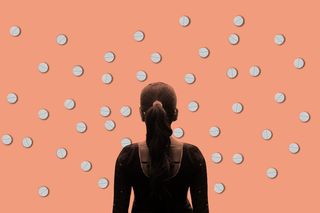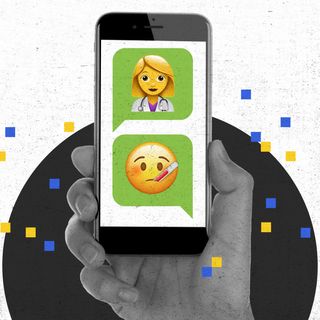
How the Morning‑After Pill Became the Most‑Used Birth Control for Young Indian Women
Misleading advertising, easy over-the-counter access drive emergency contraceptive pill misuse in young heterosexual women.

The first time R.G., 25, took an emergency contraceptive pill was three years ago — she was panicked and regretted not researching the side effects. “What followed was a [period] of irresponsible consumption of the pill for about a year until I ended up miserable and still unaware of the cause… The goal was to not end up pregnant, and I had no idea I’d end up with suicidal ideation instead,” she recalls.
In addition to the significant impact on her mental health, the frequent usage of emergency contraceptive pills also made her periods extremely irregular, heavy, and painful.
An emergency contraceptive pill, also known as the “morning-after pill,” helps prevent pregnancies following either unprotected sex or the failure of other forms of contraception, like a condom tearing or a missed daily hormonal pill. Basically, it is a “back-up” level of protection, leading to its brand name in the U.S.: Plan B. In India, the pills became an over-the-counter drug in 2005, i.e. not requiring a prescription. Since then, for many young women like R.G., emergency contraceptive pills have become the most opted method of contraception. In fact, India is the third-largest market for morning-after pills in the world.
Many doctors express concerns over the indiscriminate use of these pills as a substitute for regular contraceptives instead of being reserved for emergencies, as intended. According to Dr. Tanaya Narendra, an internationally trained embryologist, scientist, and women’s health content creator, even though these pills may not have any long-term side effects, the short-term effects can be damaging by themselves.
Apart from disrupting people’s cycles, emergency contraceptive pills can lead one to experience abdominal pain, fatigue, headaches, breast tenderness, and vaginal spotting or bleeding – side-effects that people often either don’t know of or don’t prepare for.
The lack of education about sex and the different contraceptive methods in India often means people are not making an informed choice to take morning-after pills.
G.M.’s (20) menstrual cycle became completely disrupted due to using emergency contraceptive pills almost twice a month when she was 18. In addition, she was also unaware that emergency contraceptive pills did absolutely nothing to prevent sexually transmitted infections (STIs). “My doctor was so angry when I told her that I used so many pills in one year,” she says.
The lack of sex education also leads to ignorance that the pill is not as effective as other contraception forms, with a 10-25% failure rate. In comparison, regular-use birth control pills have an effectiveness rate of 99.7%, and IUDs have a failure rate between 0.2% to 0.8%. Male condoms, which are an easily available option, have an effectiveness rate of 98% against pregnancies.
Further, emergency contraceptive pills also make people more vulnerable to unplanned pregnancies because of disrupted menstrual cycles. “[It] can throw off people’s calculations about when they’re in their fertile period… that’s one of the obvious risks that comes with using the pill,” Dr. Narendra explains.
Karishma Swarup, a sexuality educator, believes one of the biggest reasons people choose the morning-after pill over other contraceptive methods — sometimes to the extent of popping one each time they have sex — is easy access. “Simply going into a shop and buying a pill is a lot less scary than having to consult a doctor to get on long-term birth control. It’s easy; it’s quick,” she says.
Even if one does decide to get on birth control pills, one of the biggest mountains they have to climb is finding a non-judgemental medical practitioner who can advise them appropriately, Dr. Narendra notes. “Access to sex-positive doctors — someone who can counsel you about your contraception options — is very limited [in India].”
For G.M., at 18, emergency contraception seemed like the easier alternative since she couldn’t really speak to her mother about putting her on birth control pills.
Related on The Swaddle:
Scientists Develop a Promising Contraceptive That’s Non‑Hormonal in Nature
On the other hand, Swarup notes that the misinformation around regular birth control pills, which many believe can make them infertile, makes people choose emergency contraceptive pills without realizing that an emergency contraceptive pill contains the same hormone as an everyday pill, “just in a much higher dose.”
While it might be difficult for people to access birth control pills, condoms are widely advertised, easily available, and, unlike both birth control and morning-after pills, also offer protection against STIs. Why then do women continue to resort to emergency contraceptives?
The answer lies in patriarchy and the entitlement it enables men to experience pleasure without any “barriers.” The entitled expectation of having unprotected sex is despite a 2014-15 National Family Health Survey showing that 97.9% of sexually active men in India know the importance of using condoms.
Manvi* says she took her first emergency contraceptive pill at 19 when her then-boyfriend wanted to be “properly intimate” with her and told her to “just take a pill and get over it.”
“He convinced me that sex is best when had without a condom, and I, wanting to please him, went ahead with this…,” she says, adding that he’d “forget” to pick up condoms and tell her, “if anything goes wrong, your name will only be tarnished, you know… so it’s better if you just take a pill.” So, “we continued engaging in consensual sex with or without condoms, but always banking on the i-Pill,” she says.
She admits to not knowing about its side effects for a long time until she started noticing how they disrupted her menstrual cycles, led to facial acne breakouts, and caused unnatural bloating.
Shivangi, too had a similar experience with her ex-boyfriend when she was 19. He wanted to have unprotected sex and told her that not doing so would “ultimately add [to] dissatisfactions” in their relationship.
***
What also makes emergency contraceptive pills the go-to option for young women is the ubiquitous advertising of emergency contraceptive pills. These ads “will just show you a frolicking heterosexual couple,” without making the target audience aware of any potential side-effects, says Dr. Narendra. That’s what drove Manvi, and others like her, towards morning-after pills.
“Advertisements make people believe that [emergency contraceptive pills are] an easy and safe way of handling unplanned intercourse … Women are not fully aware that they have side effects,” noted Dr. Indira Ganeshan, a Delhi-based gynecologist.
While these advertisements make women aware of easy access to an option that allows them control over their own bodies, experts believe governments and policymakers must make people aware of the risks that come with it; so that they can still choose, but in an informed manner. One option is mandating that pharmaceutical companies selling these products — and generating multi-crore revenues — educate consumers about side effects through their ads.”The rise of the pill in India clearly indicates that the private manufacturers are selling the [emergency contraceptive pills] to release women from the anxiety of unintended pregnancy, at the cost of their health,” Jagriti Gangopadhyay, an assistant professor of sociology at Manipal University, wrote in 2018.
Related on The Swaddle:
All You Need To Know About IUDs
This widespread misinformation about emergency contraceptive pills often leads people to use them as a preventative measure even when there isn’t a high risk of pregnancy, believing it is harmless and could save them the trouble of dealing with an unwanted pregnancy. Dr. Narendra mentions coming across people who decided to pop morning-after pills in situations like their male partner touching their vulva with the same hand they had previously ejaculated into or touched their pre-cum with.
“Just the other day, two different individuals texted me to ask if they should just take two emergency contraceptive pills [to be extra safe],” Swarup says, adding that doing so would have worsened the side effects. She notes that many others may never have consulted medical professionals and consumed multiple pills in a moment of panic.
And that is what lies at the core of the morning-after pill’s popularity: it serves as a failsafe and buys people their “peace of mind”.
“Emergency contraceptive pills are empowering. They put the control of your reproductive rights into your own hands,” Dr. Narendra says, adding that just because one had unprotected sex once, or their contraceptive failed, doesn’t mean they should suddenly have to start preparing to bring up an unplanned baby. Emergency contraceptive pills allow women not to have to make that choice, she explains. Especially since accidents can happen and abortion may not be an option for everyone due to inaccessibility, religious beliefs, or other factors.
Dr. Narendra believes that as one ages, they can often afford medical advice that prevents them from relying solely on morning-after pills to avoid pregnancies. Moreover, with age comes experience too — of having lived through the side-effects themselves and seeing other people either dealing with the same or opting for other alternatives.
Essentially, although emergency contraceptive pills provide a good backup alternative, their use in non-emergency situations can greatly damage women’s mental and physical health.
“Access to emergency contraception was a feminist revolution in every which way… but it’s becoming a means to control us now,” Dr. Narendra notes.
Devrupa Rakshit is an Associate Editor at The Swaddle. She is a lawyer by education, a poet by accident, a painter by shaukh, and autistic by birth. You can find her on Instagram @devruparakshit.
Related


Emojis Could Bridge Crucial Doctor‑Patient Communication Gaps: Experts
